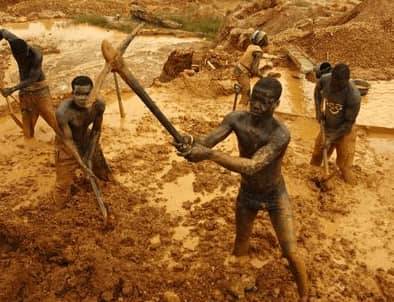Galamsey in Ghana: A Growing CrisisGalamsey, an informal and often illegal small-scale mining activity, is a significant issue in Ghana today. The term "galamsey" is derived from "gather them and sell," reflecting the unregulated and informal nature of the operations. Over the years, galamsey has transformed from a livelihood activity for rural communities into a nationwide problem with devastating social, economic, and environmental consequences.Causes of GalamseySeveral factors have contributed to the rise of galamsey in Ghana:Poverty and Unemployment: In many rural areas, limited economic opportunities drive people, especially the youth, into galamsey. It is seen as a quick way to make money, given the country's rich mineral resources, particularly gold.Weak Regulatory Enforcement: While Ghana has laws governing small-scale mining, enforcement has been weak. Corruption, inadequate resources, and political interference often undermine efforts to crack down on illegal operations.Demand for Gold: The high global demand for gold and other minerals incentivizes illegal mining activities. Many foreign nationals, especially from China, have also been implicated in illegal mining operations in the country.Environmental ImpactThe environmental impact of galamsey is alarming. It has led to:Deforestation: Large swaths of forest reserves have been destroyed to make way for mining operations. The depletion of forests has had a knock-on effect on biodiversity and climate regulation.Water Pollution: Galamsey activities often involve the use of mercury and cyanide, which contaminate water bodies. Rivers such as the Pra, Ankobra, and Offin have been heavily polluted, making them unusable for agriculture, fishing, and drinking.Soil Degradation: The use of heavy machinery and chemicals in illegal mining has rendered large areas of land infertile, affecting agricultural productivity.Social ImpactHealth Issues: Communities in mining areas face numerous health risks. The use of toxic chemicals has been linked to respiratory issues, skin diseases, and mercury poisoning.Displacement of Communities: Illegal mining has led to the displacement of many communities, as their lands are taken over by mining operations. This displacement exacerbates poverty and social tensions.Crime and Social Instability: The rise of galamsey has led to an increase in crime and social unrest, as competition for control over mining sites sometimes results in violence.Government Efforts to Curb GalamseyThe Ghanaian government has taken several steps to tackle the galamsey menace. In 2017, a national task force, the Operation Vanguard, was launched to clamp down on illegal miners. The government has also introduced policies to regularize small-scale mining operations and offer alternative livelihood programs to those involved in illegal mining.
Despite these efforts, the problem persists, largely due to the lucrative nature of illegal mining and weak enforcement of the law. Many argue that political will is lacking, with claims of complicity by local and national politicians who benefit from the activities.The Way ForwardAddressing the galamsey crisis requires a multi-faceted approach:Strengthened Law Enforcement: The government needs to ensure stricter enforcement of mining regulations, with severe penalties for violators.Community Engagement: Empowering local communities with education and alternative livelihoods will reduce their reliance on illegal mining.Sustainable Mining Practices: Encouraging environmentally sustainable small-scale mining practices can help reduce the ecological damage caused by galamsey.International Collaboration: Since some of the illegal miners come from outside Ghana, collaboration with neighboring countries is essential to curb foreign involvement in galamsey activities.In conclusion, galamsey remains a major challenge for Ghana, threatening its environment, public health, and social fabric. A committed, coordinated effort from the government, communities, and international partners is crucial to addressing this crisis and ensuring the sustainable development of the country’s mining sector.
This How illegal minning has destroy Ghana's forest and water bodies
😤😤😤😥So sad
Galamsey, an informal and often illegal small-scale mining activity, is a pressing issue in Ghana today. The term "galamsey" is derived from "gather them and sell," reflecting the unregulated nature of these operations. Over the years, what began as a livelihood activity for rural communities has escalated into a national problem with significant environmental, social, and economic consequences.Causes of GalamseySeveral key factors contribute to the persistence and growth of galamsey in Ghana:Poverty and Unemployment: In many rural areas, the lack of viable economic opportunities drives people, particularly young men, into illegal mining. Gold, abundant in Ghana, is seen as a quick way to make money, even though it is often at a high environmental and social cost.Weak Regulatory Enforcement: Despite Ghana having clear laws on mining, enforcement has been weak. Corruption, political interference, and a lack of resources allow galamsey operations to continue with little to no legal consequence.High Global Demand for Gold: The rising global price of gold has increased illegal mining. Additionally, the involvement of foreign nationals, particularly from China, has exacerbated the situation. Their advanced equipment allows for deeper and more destructive mining operations.Environmental ImpactThe environmental destruction caused by galamsey is widespread and alarming:Deforestation: Vast tracts of forest reserves are cleared to make way for mining, contributing to loss of biodiversity and disrupting natural habitats.Water Pollution: Toxic chemicals such as mercury and cyanide used in processing gold are dumped into rivers and streams, severely contaminating vital water sources. Major rivers like the Pra, Ankobra, and Offin are now heavily polluted, making them unsafe for drinking, agriculture, and aquatic life.Land Degradation: The excavation of large pits and the use of heavy machinery have left landscapes barren and unproductive, making it nearly impossible to restore the land for agriculture or other uses.Social ImpactThe societal costs of galamsey are just as dire:Health Hazards: Communities living near illegal mining sites face exposure to toxic chemicals, leading to health issues such as respiratory diseases, mercury poisoning, and waterborne illnesses.Displacement: Many people are displaced as galamsey operations encroach on farmland and residential areas, forcing them to relocate and lose their primary sources of livelihood.Crime and Conflict: Galamsey often fuels local conflicts and crime, as different groups compete for control of mining sites. It also creates a cycle of corruption, with local authorities sometimes involved in protecting illegal miners.Government Efforts to Combat GalamseyThe Ghanaian government has implemented several initiatives to address the galamsey crisis. Notably, in 2017, it launched Operation Vanguard, a military-led task force aimed at eradicating illegal mining operations. Additionally, the government has promoted the formalization of small-scale mining and introduced alternative livelihood programs to transition illegal miners into legal employment.Despite these efforts, the problem persists. The financial lure of illegal mining, combined with weak enforcement and political corruption, makes it difficult to fully eliminate galamsey activities. Some experts argue that there is a lack of consistent political will, with many politicians and local leaders allegedly benefiting from the illegal mining industry.The Way ForwardAddressing the galamsey crisis will require a comprehensive, multi-faceted approach:Stronger Law Enforcement: The government must commit to stricter enforcement of mining laws, ensuring that those engaged in illegal mining face appropriate penalties.Community Engagement and Education: Raising awareness about the long-term environmental and health impacts of galamsey, coupled with offering alternative livelihoods, can reduce reliance on illegal mining.Sustainable Mining Practices: Encouraging environmentally sustainable small-scale mining could balance the need for economic development with the preservation of natural resources.International Cooperation: Given the involvement of foreign nationals, international collaboration is essential. Ghana must work with neighboring countries and global organizations to regulate illegal mining activities and ensure responsible gold sourcing.ConclusionThe galamsey crisis in Ghana poses a serious threat to the environment, public health, and the country's social fabric. While the government has made some progress in curbing illegal mining, much more needs to be done. A united effort from the government, communities, and international partners is critical to eradicating illegal mining and promoting sustainable development within Ghana’s mining sector. Without decisive action, the consequences of galamsey could undermine the country's long-term economic and environmental well-being.


